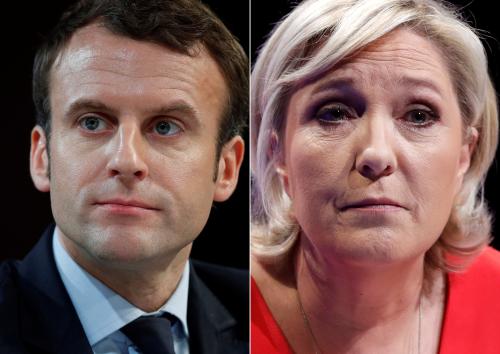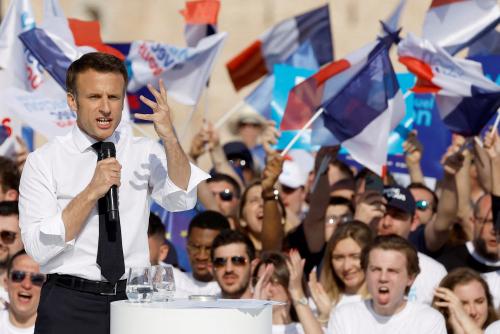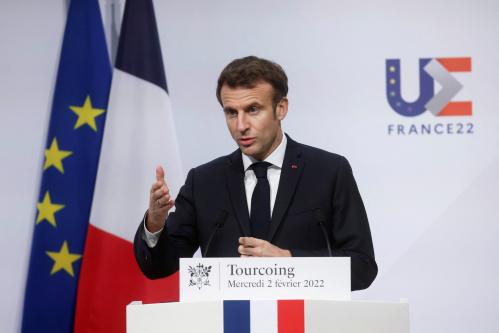French president Emmanuel Macron’s year-old political party, La République en Marche (LEM), has won a large majority in the two-round parliamentary elections that took place on June 11 and June 18. With its ally Mouvement Démocrate (Modem), the president can now count on the full support of 361 members of parliament (of a total of 577).
This is a truly extraordinary result in a country where right- and left-wing parties have alternated in power since the legendary war hero Charles de Gaulle left the presidency in 1969. The general’s 7th successor is already redrawing France’s domestic politics like never before. A stunning 75 percent of the National Assembly is made of people who were never elected deputies before, including a record number of women (233).
An opposition weak and divided
What about the opposition to a government claiming to be “neither right nor left”? With 126 deputies, the conservative party Les Républicains (LR) will be the lead opposition force, and will probably move more to the right in order to distinguish itself from what it considers a center-left government (this, in spite of the fact that Macron notably managed to attract key right-ring figures—including his prime minister, Edouard Philippe, and his economy and budget ministers Bruno Le Maire and Gérald Darmanin—all of whom were former Les Républicains).
There will be other opposition deputies, in scattered numbers: 46 Socialists; 16 members of Jean-Luc Mélenchon’s far-left “Unbowed France” movement; ten Communists; eight from the far-right Front National, including their leader, Marine Le Pen; and ten independents. These are the remains of France’s outgoing political system.
François Hollande’s utterly divided Socialist party, in particular, is in a state of shock, and its leader immediately stepped down after the final parliamentary vote on Sunday. The much-reduced Socialist parliamentary group has been emptied of its smartest or most influential members—they’ve either joined Macron’s team (e.g. Foreign Minister Jean-Yves Le Drian or Interior Minister Gérard Collomb, who used to be the Mayor of Lyon) or lost their parliamentary seats. Former socialist prime minister Manuel Valls barely kept his constituency near Paris, but with a razor-thin 139-vote majority, his opponent is contesting Valls’ victory. To the right, 44-year old former Minister of Ecology, Sustainable Development, Transport and Housing Nathalie Kosciusko-Morizet—the leader of LR in Paris—also lost her bid for election.
Reforms, already
Legislative work on implementing reforms—especially labor laws—will have to start soon (over the summer extraordinary parliamentary session), as those are time sensitive. The far-left, and to a lesser extent the right, will try to disturb Macron’s plans as much as possible. Without a parliamentary group, the far-right won’t have a voice at all.
Within LEM, many of the newly-elected parliamentarians are coming from civil society. They will discover a whole new world of politics, which comes with a few hiccups and disappointments in a country where the executive branch—under a very powerful president (remember that Macron was elected by 66 percent of the French in May)—runs the show. In addition to a well-balanced team of ministers coming from various sides of the political spectrum, the government will be assisted by experienced and highly motivated civil servants, most of them graduates from France’s best universities and elite schools. They will usher through reforms. Deputies who have been elected for the next five years under the LEM banner, thanks to the new president’s name, will have to quickly adjust to being part of a large majority that needs to move quickly.
Macron’s challenge is now to bring together French society—including the millions who did not vote. A massive 57.4 percent of voters abstained in the second round, leading Prime Minister Edouard Philippe to comment: “abstention is never good news for democracy. The government translates this as a will to succeed. Now is the time for action for the presidential majority.”
With one party now in power across French government, expectations are running high. The country is in deep need of reform. There are also hopes, at the European level, that France could become a new center of gravity if Macron succeeds in reform efforts. Following last year’s referendum, the U.K. is starting Brexit negotiations with the European Union and will go through considerable changes over the next few years. Meanwhile, Germany, which may have been resting on its laurels, is in need for a stronger counterpart at the core of Europe. With a majority in a vastly renewed French National Assembly, Macron is now able to really roll up his sleeves. He should take care not to disappoint his many supporters.









Commentary
Macron’s stunning reshaping of French politics
June 20, 2017